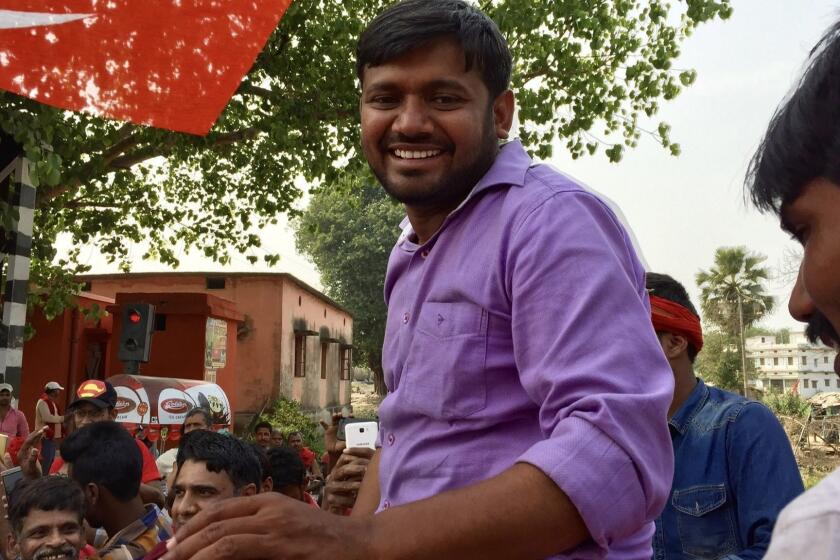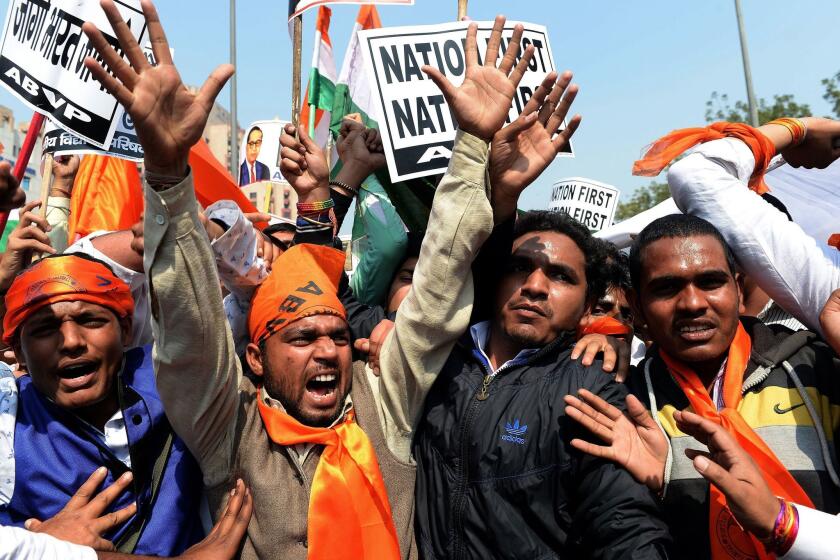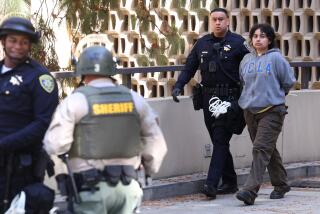A masked mob tore through an Indian university. Why didn’t police act?
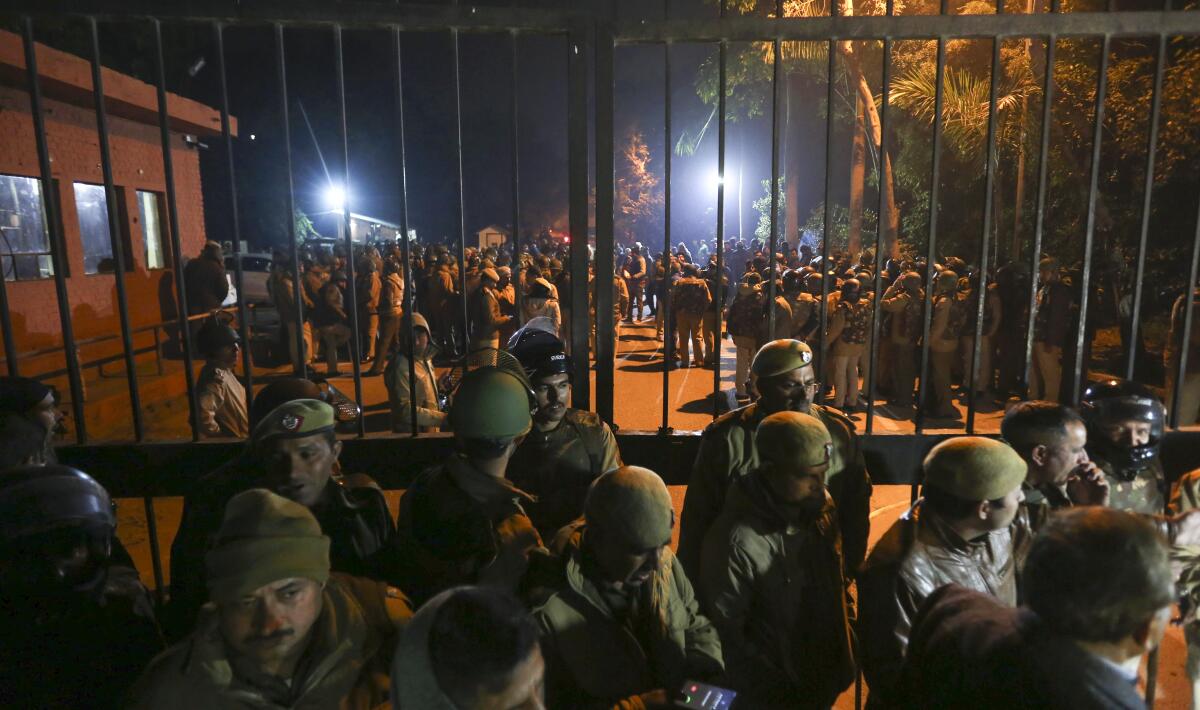
- Share via
NEW DELHI — The masked mob tore through dormitories inside one of India’s leading universities, beating students and teachers with sticks and rods, as horrified students captured the rampage on their cellphones.
When the violence ended with more than 30 people wounded, the questions only deepened: Who were the assailants and why didn’t police — who have lately been accused of using extreme force against demonstrators — stop the attack?
The incident late Sunday at Jawaharlal Nehru University in New Delhi was the latest violent turn in weeks of unrest across much of India after the passage of a controversial citizenship law championed by Prime Minister Narendra Modi’s Hindu nationalist government.
Although the attack was not directly linked to protests over the law, which many say discriminates against Muslim immigrants, it comes at a time of intense polarization over Modi’s efforts to abandon India’s constitutionally enshrined secularism and make it a more overtly Hindu nation.
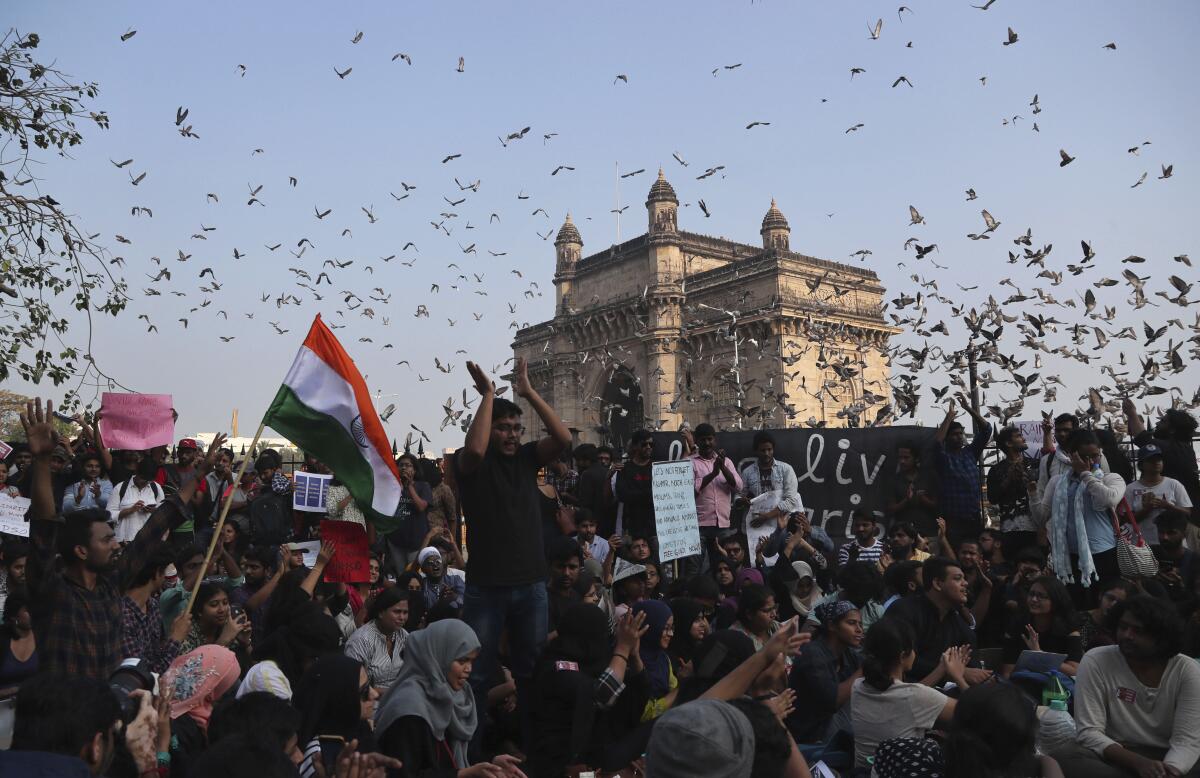
The attack is widely believed to have been carried out by members of the right-wing Akhil Bharatiya Vidyarthi Parishad, or ABVP, the youth arm of a Hindu nationalist organization that is closely linked to Modi’s party and opposes what it describes as liberal ideologies on India’s college campuses.
Multiple Indian media outlets Monday reported that the attack appeared to have been planned in WhatsApp message groups and traced some numbers in those groups to ABVP members.
Messages called for “communists” to be beaten up and bragged about attacking students after entering campus dorms, the news website Scroll reported.
The group denied involvement, blaming the attack on “leftist” students. Modi’s Bharatiya Janata Party condemned the violence but called it a “desperate” move by “forces of anarchy.”
The university, named for India’s first prime minister and located next to a vast forest in the southern part of the Indian capital, has long been a target of right-wing ire because of its history of producing left-leaning scholars and activists. In 2016, the student body president was arrested and charged with chanting “anti-national” slogans at a meeting he organized to mark the anniversary of the execution of a convicted terrorist.
The crowd at a campaign event for India’s oldest communist party shouted “Lal Salaam,” or “red salute,” while showering the candidate who arrived in their village with garlands.
Among those injured Sunday was the current student body president, Aishe Ghosh, who was seen bleeding severely from the head in a video that went viral online.
“I have been brutally attacked by goons who were masked,” she said. “I’ve been bleeding. I’m not even in a condition to talk.”
Shwetank Tewari, a 31-year-old doctoral student, was in a friend’s dorm room when members of the mob tried to break in and attack them, he said. Tewari and a group of about 15 other students and one professor blocked the attackers from getting in.
But 24 hours later, he still hadn’t left campus, fearing members of the mob were still in the area.
“There are rumors flying all over the place,” he said. “Everyone is terrorized, everyone is in a state of panic.”
Tewari and other students said attackers were going through dorm rooms, picking targets based on the occupants’ religion or perceived ideology.
“They selectively targeted the rooms of the students who are Muslims and are from a different political opinion or party,” he said. “We were able to hear [them say] ...’Go to this room, go to that room — this room is ours, that room theirs.’”
The accounts and the university’s history of activism led many to reject the ABVP’s assertions that left-wing students carried out the attack. The group, which claims millions of members across thousands of chapters nationwide, has a history of disrupting campus events and clashing with rivals.
“Why would [the] left attack their own student activists?” tweeted Rajdeep Sardesai, a prominent news anchor.
They have disrupted movie screenings, scuffled with fellow students and briefly held a liberal journalist hostage.
Witnesses said police allowed the mob to go after students and their defenders. Yogendra Yadav, a prominent activist and alumnus, said a police inspector and a group of ABVP activists together beat him outside the university. Later, in a separate incident, the mob pushed Yadav to the ground and kicked him in the face while calling him a “Naxalite,” a term associated with India’s extreme left-wing movements and used disparagingly by the Hindu right.
In several cities in India, student groups gathered Monday to protest the attack and question how the mob was allowed into the campus. Some asked why police, who have been accused of using excessive force to quell anti-citizenship law protests in which 26 have been killed since last month, appeared to stand by while students were beaten.
It was a particularly sharp contrast with a Dec. 15 incident in Delhi when police stormed the library at Jamia Millia Islamia — a university with a predominantly Muslim student body — even though many students inside were not involved in a nearby anti-citizenship law protest.
“Delhi police can enter Jamia campus to beat up students but has no interest to enter JNU campus to protect students from heavily armed goons,” tweeted Vivek Tankha, a lawyer and lawmaker.
Delhi police said they had opened an investigation into the incident and charged some individuals with rioting, but declined to offer details. Calls to the police were not returned.
At the university, many students now say they lack faith in authorities to prevent mobs from returning.
“We do not trust the police, because the police has failed to provide us protection,” Tewari said. “We do not know who to trust.”
Malhotra is a Times special correspondent.
More to Read
Sign up for Essential California
The most important California stories and recommendations in your inbox every morning.
You may occasionally receive promotional content from the Los Angeles Times.
